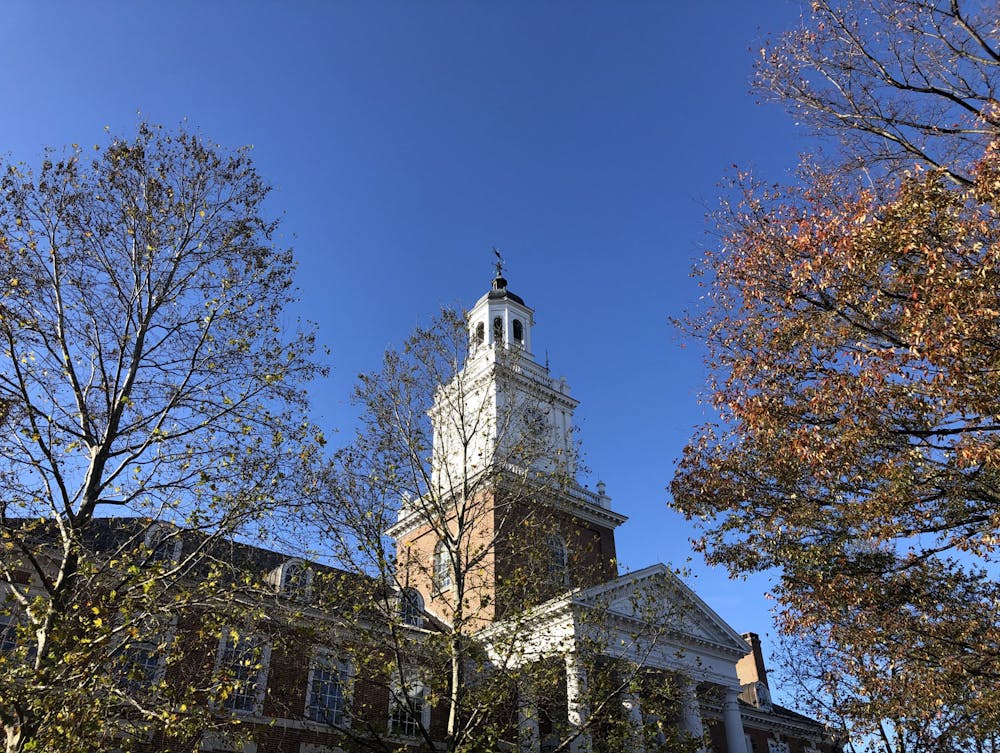The Second Commission on Undergraduate Education (CUE2) released its final report on Nov. 20. The report made a wide array of recommendations to improve the undergraduate experience at Hopkins, including replacing the distribution requirements to obtain a degree. CUE2 was formed in 2017 to promote interdisciplinary learning and mental health on campus.
Co-chaired by Whiting School of Engineering (WSE) Dean Ed Schlesinger and former Krieger School of Arts and Sciences (KSAS) Dean Beverly Wendland, CUE2 is made up of 30 faculty, staff, administrators, undergraduates and alumni.
Since its creation, CUE2 has released draft plans and held town halls to collect community input on its recommendations.
In email to The News-Letter, Student Government Association Junior Class President Nathan Mudrak stated that CUE2 successfully took student voices into consideration.
“My confidence in the report is especially gained by the comprehensive and thorough approach the commission took to garnering student feedback,” he wrote. “Personally, my communication with the commission’s leads has been remarkably productive and fruitful. I look forward to continuing to work with them as we discuss the finer details of the report’s actualization.”
In the forward to the report, Wendland and Schlesinger addressed how the pandemic has impacted CUE2’s recommendations.
“The CUE2 report and its aspirational recommendations are even more important for a post-COVID-19 world and for a country intensely engaged in social discord than it was before,” they wrote. “Some of the recommendations offer rich and unprecedented opportunities to shift the ethos of our undergraduate education and for holistic examination of complex issues of bigotry and racism in our institutions and culture.”
The report emphasizes expanding accessibility at the University.
“The commission was concerned by evidence that the opportunities presently available at Hopkins are not available equally to all,” the report reads.
CUE2 made several recommendations to increase accessibility between KSAS and WSE.
Notably, the report called for replacing the current system of obtaining a degree by restructuring the undergraduate curriculum around the development of “six foundational abilities.”
“The current distribution requirements system should be replaced with a mandate and mechanism by which students acquire newly defined foundational abilities in language and writing; scientific, numerical, and algorithmic reasoning; interpreting complex creative expression; citizenship in a diverse world; reflective ethical agency; and independent conceptualization and collaborative undertaking of large-scale, consequential projects,” the report reads.
In addition to rethinking the University’s distribution requirements, CUE2 argued that the University should require students to take a first-year seminar with a full-time faculty.
The report asked that the University give students the option of taking a “Hopkins semester” of independent study in their junior or senior year. Students would use the semester to engage in a semester-long internship or research project.
The parameters of the Hopkins semester evolved over the report’s drafts; it was originally seen as an opportunity for students to engage in a research project outside their field of study.
Instead, in order to accommodate the Hopkins semester, CUE2 recommended that the University change its major requirements. Under the final plan, undergraduates should take at least 33% of their classes outside courses necessary for their major.
CUE2 also proposed that Hopkins ensure that financial assistance is offered to students seeking instruction, mentorship and seminars by professors in the University’s professional schools.
“Undergraduates should have access to the full breadth of talent represented in the university’s faculty,” the report reads. “The provost should direct every division of the university to demonstrate that they have both individual courses and master’s programs open to Hopkins undergraduates.”
Additionally, CUE2 asked the University to expand advising for undergraduate students. Instead of simply having academic and major advisors, the commission believes that each student should also be given a faculty mentor and a coach in the Life Design Lab.
The final report also suggested changes to the process of assessing teaching and advising at the University.
“The assessment of teaching and mentoring now in place at Hopkins requires immediate reform,” the report reads. “The provost should charge the vice deans of education from across the University to determine comprehensive, transparent practices for the assessment of teaching and mentoring for all Johns Hopkins faculty.”
In addition, CUE2 stressed that faculty members must be able to clearly state the knowledge and skills they expect students to learn by the end of the course. The commission also highlighted the need for students to receive comprehensive feedback on their work. According to CUE2, student work should be assessed on an individual level without reference to other students’ work.
Mudrak emphasized the importance of continuing listening to student voices as the final report is implemented.
“While students certainly need to continue to be consulted as the final report is implemented, the commission’s previous actions give me the hope and confidence to believe that their student-centered focus will remain,” he wrote.
Students on CUE2 could not be reached for comment as of publication.





